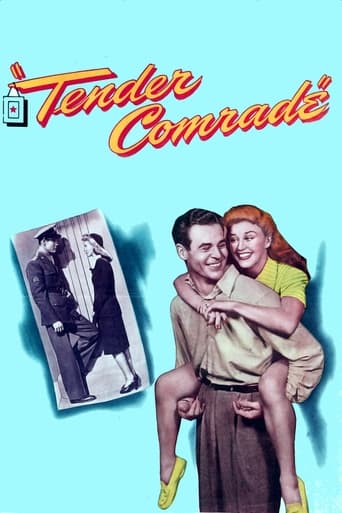clanciai
A great film about a small world, the reality of four young wives with their husbands out in the war, sharing a common household to minimize expenses but not managing very well, so they hire a housemaid, who happens to come from Dresden, Germany, with fresh experience of the nastiness of the nazism that murdered that democracy. Yes, there is much war propaganda here, the year was 1943, so it was inevitable, but just forget it, and concentrate on the excellent direction of Edward Dmytryk (as usual) in bringing to life the reality of these soldiers' wives, one of them being Ginger Rogers (for once without any song or dance) and her husband being Robert Ryan as young and fresh and handsome as Gregory Peck. The best scenes are flashbacks of their marriage before the war, which gives a very intimate and interesting insight into the art of direction by Edward Dmytryk. He must have had an expert hand with women.And that's not all. The script is by a young and early Dalton Trumbo, later one of the best script writers of Hollywood after Ben Hecht, and the music adds to it as well. It's almost all domestic scenes inside the common house of the five dames, but it is outstanding as a chamber play. Some get their husbands back from the war, others do not. It is a unique film in its sensitivity of rendering the reality of soldiers' wives some justice and intimate documentation.
edwagreen
No, this is not some Russian comedy staged during World War 11. That's what I thought it was about when I saw the title of this 1943 film.Instead, we get a nicely crafted story with Ginger Rogers and Robert Ryan, a young idealistic couple, whose plans are thwarted by World War 11. Yes, this is another home front picture. Several women decide to live in the same house when their spouses go off to war.Definitely a tribute to the human spirit. Flashbacks are well done to show that the problems that Ryan and Rogers encountered with their marriage mean nothing when our country called upon its citizenry to create their finest moments.While the movie ends on a down note, Rogers' final lines may be regarded as a bit too preachy; however, they were needed and served the country well during one its many critical periods.
spost8260
"Tender Comrade" was the only film made during the second world war showing what it was like to be a war bride. It just about covers every detail of home life during this time period, such as rationing booklets, war plant jobs, friendships, worries, "not to talk about troop movements" in public and everything a war bride had to deal with. I'm sure one cam complain about dialog, scripts, camera angles, etcetera, but life wasn't perfect and this film recreates life during a time when "politically incorrect" was not mandatory. People actually talked like that then. They dressed like that, lived like that. This film is as close to factual representation of a war bride as anyone ever got and I, for one, am thankful it was filmed and still lives on. Everyone seems to remember the soldier, but not so much about what their wives, mothers, sisters and daughters had to endure while being left behind to wait for their return. Thank you, Mr. Dymytryk.
dexter-10
It's unfortunate that a film with a good cast never really becomes as good as it might. The idea of women working during the war in the war production plants was critical to the war effort, and the attempts at coping with an almost unbearable life situation with women workers sharing a house while their husbands are overseas was common enough to have true dramatic value; yet, this movie never seems to reach its high potential.The reason seems to be in the incredibly poor script, not so much in terms of plot, but in relation to what seems to be substandard language. It's unfortunate that the actors are saddled with such lines as: "If I see you looking sideways at another girl, I'm going to hit you over the head with an axe handle," "It's okay, mom, he's going to marry me," "Why don't the mice pay their share of the rent," "You don't carry a mop length-wise...you carry it like a fishing pole," and "I'm going to beat those rugs until they sit up and yell 'Uncle'."




